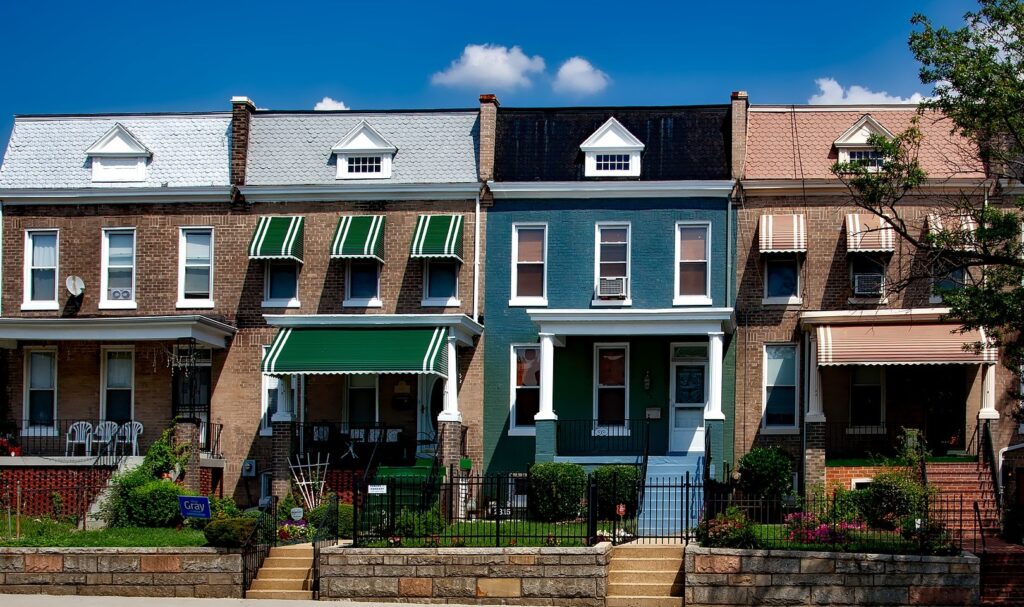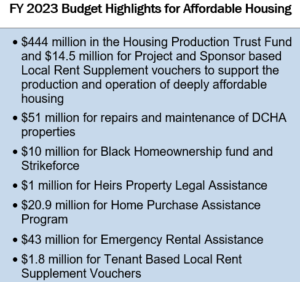
The approved fiscal year (FY) 2023 budget includes unprecedented levels of funding for housing production and significant investments in homeownership that will, if accompanied with vigilant oversight and effective management, make affordable housing more abundant and accessible in the District over time. However, lawmakers underfunded or failed to fund more immediate-term strategies to support residents with the lowest incomes and stem the displacement of Black and brown residents happening today.
A dramatic increase in the cost of housing is primarily responsible for the decades-long wave of displacement of residents with the lowest incomes, who in the District are disproportionately Black and brown. An analysis of recent census data shows that, while in 2000, 32 of DC’s 62 residential neighborhoods were majority Black, by 2020 only 22 residential areas remain majority Black. In that time period, the Black population declined by nearly 58,000 while the white population grew by almost 86,000.[1] Enacting policies and funding programs that allow Black residents to stay in their homes is essential to stemming the tide of displacement.
 The pandemic-induced recession and slow recovery for Black and brown residents has further intensified displacement pressures. For example, Black unemployment is 12.5 percent compared with just 1.7 percent for white residents. Too many Black and brown residents in DC face a real crisis and cannot wait for long-term solutions, such as the production of new affordable units. The FY 2023 budget includes nearly $450 million for the Housing Production Trust Fund, the District’s primary tool for the creation of affordable housing units, almost to the exclusion of other affordable housing tools. In the District, both short- and long-term strategies are needed to keep residents with low incomes in their homes and neighborhoods and advance racial justice.
The pandemic-induced recession and slow recovery for Black and brown residents has further intensified displacement pressures. For example, Black unemployment is 12.5 percent compared with just 1.7 percent for white residents. Too many Black and brown residents in DC face a real crisis and cannot wait for long-term solutions, such as the production of new affordable units. The FY 2023 budget includes nearly $450 million for the Housing Production Trust Fund, the District’s primary tool for the creation of affordable housing units, almost to the exclusion of other affordable housing tools. In the District, both short- and long-term strategies are needed to keep residents with low incomes in their homes and neighborhoods and advance racial justice.
Despite the critical investments in the FY 2023 budget, many fall far short of meeting the urgent need of DC residents struggling to find and keep housing. For example, while lawmakers allocated $51 million for desperately needed public housing repairs, advocates continue to testify that residents are not seeing the benefits of investments in repairs and maintenance, indicating a significant problem with planning and oversight. Lawmakers also missed several other opportunities to fund programs that would stabilize housing in the nearer term for Black and brown residents most vulnerable to displacement. For example:
- The budget includes funding for only 60 new Tenant Based Local Rent Supplement (LRSP) vouchers. These locally funded vouchers help families with extremely low incomes make rent while they wait for housing assistance from the DC Housing Authority . DCFPI estimated that 800 vouchers would be necessary to help meet need in FY 2023.
- The Emergency Rental Assistance Program (ERAP) received $43 million for FY 2023 despite the $200 million estimated need to meet the ongoing surge in demand for rental assistance. Without a significant increase in funding, the ERAP program will run out of funds, as it does every year, putting thousands of tenants at risk of eviction.
- For more than five years, lawmakers have neglected to fund the First Right to Purchase Program (FRPP). This program, when active, offers many tenants with low- and moderate-incomes, the majority of whom are Black or brown, their first opportunity for homeownership by providing low-interest loans to tenant groups that want to purchase their building when their landlord decides to sell. Advocates have been asking the Department of Housing and Community Development (DHCD) to re-open the program to new applications and to fund the FRPP at $30 million per year. This program is a necessary tool to achieve housing stability by creating limited-equity cooperatives.
Even fully funded programs fall short of achieving their goals when public officials fail to monitor implementation. For years, DC officials have failed to target housing production funds to residents most in need. Importantly, the DC Council paired this groundbreaking investment in production with major improvements to oversight. The Council passed legislation that requires DHCD to submit regular written reports to the Council on funding awards made through HPTF and on the number of affordable units produced each year. Hopefully, these reporting requirements will allow Council to hold DCHD accountable and make quicker progress toward meeting the HPTF’s affordability requirements.
Given the enormity of its affordable housing crisis, the District needs a thoughtful anti-displacement strategy that pairs long-term solutions with programs that meet residents’ urgent needs, and strong oversight of both.
[1] DCFPI analysis of decennial census data on Washington DC’s population by race from 2000 and 2020
